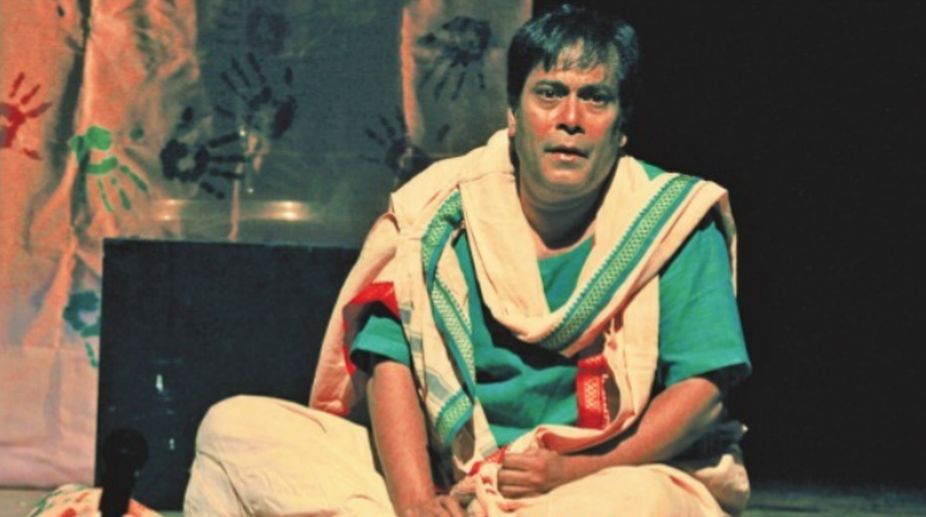An enduring classic radiantly retold
Soumitra Chatterjee’s brilliant translation of Henrik Ibsen’s Ghosts coupled with astute direction from Kaushik Sen and heart-felt performances from a great cast made Bidehi delightful on almost every front.

It is a mystery that an actor like Debshankar Halder can achieve stunning success on the stage but can barely claim a fraction of that achievement on the screen.
This may be traced to the same experience that stalwarts like Sambhu Mitra and Ajitesh Bandopadhyay had in the 1960s when they were at the height of their powers as both actor and director of the theatre groups that they had spearheaded. Sambhu Mitra had written and co-directed Jagte Raho for producer Raj Kapoor apart from acting in KA Abbas’s Dharti Ke Lal as well as films like42, Manik, Bou Thakuranir Haat and other films. Ajitesh Bandopadhyay too had acted most conspicuously in Tapan Sinha’s Haatey Bazare apart from Chhuti, Ganadevata and Aaj Kaal Parshur Galpo. In both cases, the iconic stature that they achieved on the stage was hardly reflected in their association with the cinema.
Perhaps an exception was Utpal Dutt — though the image of the relentless radical that he sustained through his PLT productions was barely reflected in the countless screen characters ranging from incurable villainy (Amaanush) to rip-roaring comedy (Golmaal, Naram Garam). There were more serious performances in Agantuk and Saheb but, in all cases, the gap between cinema and theatre was effectively bridged.
Advertisement
Whether the same experience applies to Debshankar Halder is a matter of debate. The actor declared recently in a television interview — much like many of his contemporaries — that theatre is his first love. That doesn’t mean he has spurned the cinema. Questions have even been raised about whether he is performing in too many plays at the same time. Is he doing it on account of an unshakable love for the theatre or because he must also serve commercial interests? The real question is not about the number of plays where he appears in the central role fetching the audience that the Bengali theatre needs but whether he has done justice to his roles through an unfailing sense of social and artistic commitment.
The whole scenario of group theatre in Bengal has changed over the last few years. An actor like Debshankar may have begun with a particular group but then moved out to work independently. It is much like the studio system in the pre-war years when actors and technicians were required to work under a particular banner but subsequently preferred to work independently. It led to the collapse of the studio system.
The theatre scene is somewhat different. There are some like Rudraprasad Sengupta who sustain the illustrious traditions of serious theatre and continue to offer a platform for young theatre enthusiasts. That does not prevent them from looking for opportunities on the big and small screen. One or two successful theatre personalities have discovered lasting associations in the cinema and look back on the lessons they learnt from the stage while making it clear that they don’t intend to return to that working experience. They have imbibed the culture of the screen with all its popular attractions that makes it difficult to return to the acting styles and the environment of a live audience that they have left behind. Suman Mukho-padhyay has established himself as a film dire-ctor outside the mainstream after the impressive results of plays like Raja Lear in which he directed with Soumitra Chatterjee in the title role. On the other hand, Subhashish Mukherjee, Kharaj Mukherjee and Shibaprasad Mukherjee are examples of those who look back on their roots in the theatre but are now quite happy to nurse their careers on the screen.
It is a somewhat different story with Debshankar Halder. Here is an actor with enormous talent who began in a particular group but never went on to form an organisation of his own. What he did instead was to explore a variety of experiences that he perhaps felt would bring him artistic satisfaction. It included appearances in Suman Mukhopadhyay’s award winning film Herbert and continued with more films made by Nandita Ray and Shibiprasad Mukherjee (Accident, Alik Sukh and Muktodhara) and other directors.
Alik Sukh offered the challenging role of a doctor who is confronted with a moral question after the death of a patient that brings him into a confrontation with his wife as well while Raja Sen’s Maya Mridanga also found him in the central role of a folk artist in the Syed Mustafa Siraj story on a dying art form. But, sadly, there have not been too many opportunities to make his presence felt on the screen.
Some of the more serious directors who have revealed an interest in off-beat performances have not made much effort to explore the powers that Debshankar undoubtedly possesses. There could be an element of doubt about the stage commitment that dilutes his presence on the screen. But if an actor like Utpal Dutt could strike the right chords in both forms, there is no reason why others with proven skills cannot achieve the same results. Whether Debshankar can be compared with Utpal Dutt is another matter.
What survives is the hope that there are actors capable of handling the nuances in both forms. If they excel on the stage, there is no reason why they should be wasted on the screen.
Advertisement